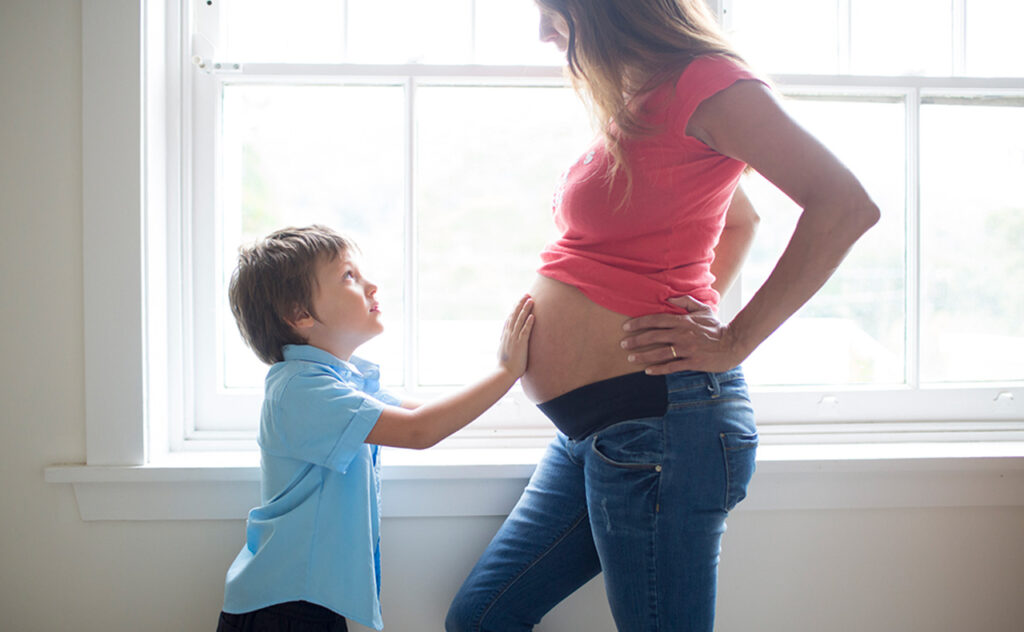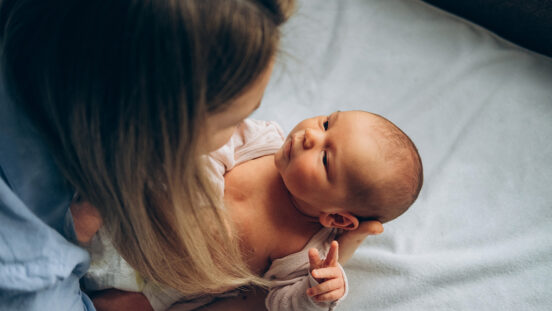Third trimester: amazing pregnancy facts

You’re on the home straight now – not long until you meet your new little person!
Hello third trimester! You might be feeling BIG but you’re so close now to finally meeting your baby.
Here are some of the fascinating facts about what goes on during the third and final trimester of your pregnancy.
What can I expect in the third trimester of pregnancy?
Did you know your unborn baby drinks (and then pees) the amniotic fluid? The whole amount is recirculated and replenished every three hours, so make sure you drink plenty of water to keep it topped up.
Want to know more? Read on for a breakdown of what you can expect in your third trimester as the weeks go on.
27 weeks pregnant
At 27 weeks your unborn baby’s eyes open, and in addition to distinguishing light from dark she learns to focus – although she’ll only be able to see objects up to about 15cm away after birth.
28–32 weeks pregnant
Between week 28 of your pregnancy and week 32 your baby gains around 500g every week. This is equivalent to a tub of margarine. So that explains why you’re suddenly busting out of your maternity clothes!
At 37.5°C your amniotic fluid is slightly warmer than your normal body temperature, to keep your unborn baby warm while she’s building up fat stores.
READ NEXT: Find baby names from all over the world on these curated lists

32-35 weeks pregnant
Your baby’s weight growth has started to slow now, with your baby gaining around 250g a week.
Your baby’s ability to smell has already developed at 32 weeks, but because there’s no air inside the womb to carry a scent your baby can’t smell anything yet.
Your baby’s brain is growing so fast that her head circumference is increasing by around 2.5cm a week at this stage – and you’re the one who has to push it out!
Your baby’s lungs are developing rapidly, too – a baby born at 34 weeks is likely to need a little help breathing, but at 36 weeks she’s almost certain to be able to breathe by herself.

35 weeks pregnant
The average weight of an unborn baby at 35 weeks is 2.46kg. No wonder your back aches!
If your baby is born now she has a 99% chance of survival.
By this time most babies have settled into the position they’ll be in at birth.
- A longitudinal position means your baby is lying vertically in the womb, either head down (cephalic) or bottom/feet down (breech).
- A Transverse means she’s lying horizontally, and an oblique means she’s lying diagonally.
- Babies in breech, transverse and oblique positions can make delivery difficult, but your baby may still change position, either of her own accord or by being manually turned by a consultant.
By 40 weeks, 95% of babies are cephalic, 4% are breech, and just 1% are transverse or oblique.
Your baby is coated with vernix, a slippery substance that helps her slide down the birth canal. This gradually washes off in late pregnancy, so while traces remain on most babies at birth, those who arrive late may not have any.
Your 35-week-old unborn baby now has fully developed hearing – so keep chatting to her!
In the last weeks of pregnancy, your baby’s digestive system fills with meconium – a dark greenish-black substance made of dead skin cells, lanugo and excretions from her bowel, liver and gall bladder. This will form her first and stickiest poo.
Your baby’s bones are hardening, but her skull stays soft and flexible so it’s easier for her to come down the birth canal.
36 weeks pregnant
At 36 weeks your baby’s head moves down into your pelvis. When only two-fifths of her head is above the pelvic bone she’s considered ‘engaged’ and is all set to be born.

37 weeks pregnant
Your baby is fully mature by 37 weeks and is safe to arrive any time. The delivery process will kick-start her heart and respiratory system so she can live and breathe in the big, wide world.
38 weeks pregnant
Even if you’re not still visibly growing, you may be feeling uncomfortable and may notice a strange sensation in your vagina as baby’s head moves against your pelvic floor.
This week, your baby sheds most of the lanugo (downy hair that covers her body) and vernix caseosa (grease that protects her skin). These waste products are swallowed by your baby and stay in her bowel until birth, when they are passed out as her first bowel movement: a sticky, tar-like black mixture called meconium.”
39 weeks pregnant
This week it’s about 266 days since conception (or 280 since the first day of your last period), and the end of pregnancy is in sight. You may be savouring the last few days of nurturing your baby inside your body; but it’s more likely that you’re desperate to meet her and get your body back!
While the rest of her organs are fully developed, your baby’s lungs are the last to reach full maturity. She’s producing a hormone called cortisone that helps her lungs mature enough to breathe air at birth.”
40 weeks pregnant
At 40 weeks your placenta is the size of a large dinner plate. It’s 2–3cm in thickness, weighs 650g and counts as a whole extra organ.
By the end of your pregnancy your uterus is 500–1000 times its normal size!
Feeling over it? Just remember that only 5% of babies arrive on their due date.




